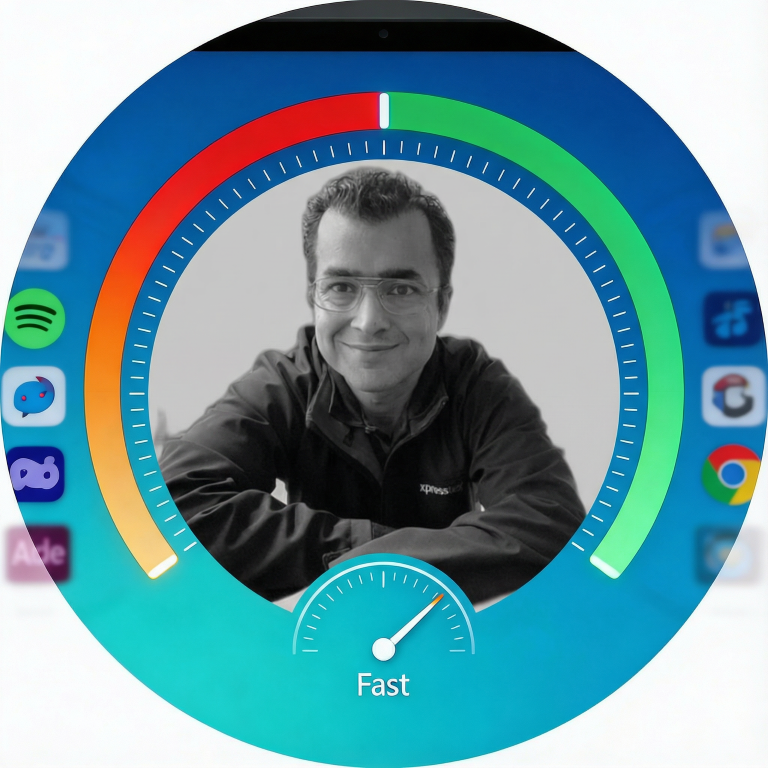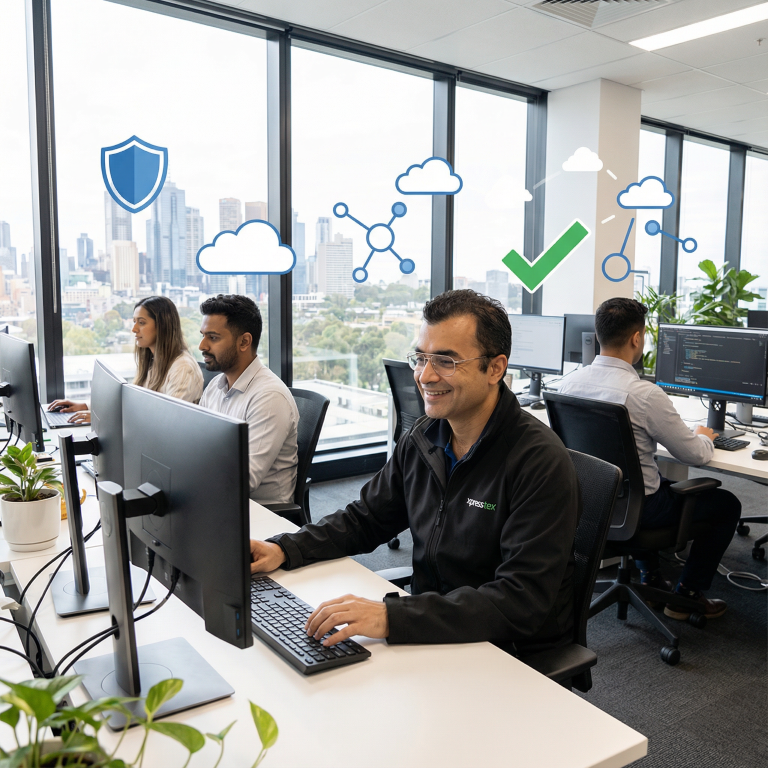
Choosing The Perfect Laptop For Work
Choosing a new laptop as a Melbourne Small Business Owner can feel like navigating a labyrinth of confusing model numbers, technical jargon, and ever-shifting prices.
It’s a significant investment, and the pressure to get it right is immense.
Your laptop is more than just a piece of technology; it's your primary tool for productivity, your connection to colleagues and clients, and the vessel for your most important work.
A great choice can empower you to work faster, smarter, and more flexibly, while a poor one can become a daily source of frustration, bottlenecking your potential and costing you valuable time.
This article is designed to demystify the process.
We'll break down every crucial factor, from defining your unique professional needs to decoding the most complex technical specifications.
By the end of this article, you'll have the knowledge and confidence to select a laptop that not only meets your current demands but also serves as a reliable and powerful partner for years to come.

Laptop Choice Matters For Your Small Business
In an era of hybrid work and constant connectivity, your laptop is the central hub of your professional life.
It’s where ideas are born, projects are managed, and collaborations happen.
Understanding the gravity of this choice is the first step toward making a smart one.
A Laptop as Your Primary Work Tool
Think about the sheer amount of time you spend interacting with your laptop.
The keyboard is your pen, the screen is your canvas, and the processor is the engine driving your every task.
Unlike a desktop computer that remains static, a laptop is a tactile, personal device.
Its weight, the feel of its keys, the clarity of its screen, and the responsiveness of its touchpad directly impact your comfort and efficiency.
The right machine fades into the background, allowing you to focus purely on your work. The wrong one is a constant, nagging reminder of its own limitations.
The High Cost of a Wrong Decision For Your Small Business
Choosing a laptop based solely on the lowest price tag is a common but costly mistake.
An underpowered or poorly constructed device can lead to a cascade of negative consequences:
- Lost Productivity: Lagging performance, slow loading times, and the inability to multitask effectively can turn simple tasks into time-consuming chores.
- Increased Frustration: A clunky keyboard, a dim screen, or a battery that dies halfway through the day can significantly impact your job satisfaction and stress levels.
- Security Vulnerabilities: Consumer-grade laptops often lack the advanced security features essential for protecting sensitive business data, putting you and your company at risk.
- Premature Replacement: An ill-suited laptop will show its age much faster, forcing you into another costly upgrade cycle sooner than you planned.
Investing wisely upfront saves money, time, and headaches in the long run.
Step 1: Defining The Needs For Your Small Business
Before you even look at a single model, you must first look at yourself and your work. The "best" laptop is entirely subjective and depends on your specific use case.
What Kind of Professional Are You?

Different jobs place different demands on a laptop. Identify which of these personas most closely matches your daily routine:
- The Road Warrior (e.g., Salesperson, Consultant): You are constantly on the move, working from airports, client offices, and hotels. Your priorities are portability, durability, and all-day battery life. You need something lightweight (under 1.5kg), robust enough to handle travel, and with a battery that won’t quit before you do.
- The Creative Professional (e.g., Designer, Video Editor, Architect): Your work involves graphically intensive software like Adobe Creative Cloud or AutoCAD. Your priorities are raw power and a superior display. You need a top-tier CPU, a dedicated graphics card (GPU), copious amounts of RAM, and a large, high-resolution, color-accurate screen.
- The Office Power User (e.g., Accountant, Data Analyst, Writer): You spend most of your day at a desk, juggling spreadsheets, documents, and multiple applications. Your priorities are a fantastic keyboard, a large screen, and strong multitasking performance. A comfortable, tactile keyboard is non-negotiable, and you'll benefit from a powerful processor and plenty of ports to connect to external monitors.
- The Hybrid Worker: You split your time between the office and home. You need a balanced machine that is portable enough for the commute but powerful enough for the office. A great webcam, a clear microphone, and versatile connectivity (like Thunderbolt™) are key for seamless transitions between environments.
Your Software Dictates Your Hardware
Make a list of the applications you use every single day.
Are you living in Microsoft 365 and a web browser, or are you compiling code and rendering 3D models? Check the "recommended system requirements" for your most demanding software—this will give you a baseline for the specifications you need.
Step 2: The Physical Experience – It's All About Touch and Feel
Specifications on a webpage only tell half the story.
A laptop is a physical object you will interact with for hours every day, and its design and ergonomics are just as important as its internal components.
The Importance of "Test Driving" Your Laptop
This is a crucial step that many people skip.
I always recommend popping into a local retail shop to get a physical look at the laptops on offer.
Online reviews are helpful, but they can't tell you how a keyboard feels under your fingers or if the laptop's weight is comfortable for you to carry.
Don't be afraid to be a little cheeky.
You can often get a better deal and a more business-appropriate configuration through a specialised IT provider, but using a retail store for hands-on research is invaluable.
Pick them up. Open and close the lid. Type a few sentences. Test the touchpad. This physical interaction will reveal preferences you didn't even know you had.
Key Physical Characteristics to Evaluate
- Weight and Portability: If you travel frequently, look for an "Ultrabook" that weighs 1.5kg (3.3 lbs) or less. If your laptop rarely leaves your desk, a heavier "desktop replacement" model (2kg / 4.4 lbs or more) is acceptable and often offers more power for the price.
- Build Quality and Materials: Laptops are typically made from plastic, aluminum, or carbon fiber. Aluminum and carbon fiber chassis offer superior rigidity and durability, which is important for longevity, especially if you travel. Check for screen flex and a sturdy hinge.
- The Keyboard and Touchpad: These are your primary input devices. For the keyboard, consider key travel (the distance the keys press down), backlighting for low-light situations, and overall layout. For the touchpad, assess its size, smoothness, and how well it responds to gestures. A poor keyboard or touchpad can be a constant source of irritation.
- Screen Size, Resolution, and Shape:
- Size: 13-14 inches is the sweet spot for portability. 15-16 inches offers more screen real estate for multitasking. 17 inches is best for desktop replacements.
- Resolution: Full HD (1920x1080) should be the absolute minimum. QHD or 4K resolutions offer sharper text and more detailed images, ideal for creative work.
- Aspect Ratio: Taller aspect ratios like 16:10 or 3:2 are becoming popular for productivity as they show more vertical content (like documents and webpages) with less scrolling.
Step 3: What Really Powers Your Work And Helps Your Small Business

This is where many people get lost, but understanding the core components is essential for choosing a laptop that will perform well and last long.
As a rule of thumb, always over-spec if you can. A slightly more powerful machine today will still feel fast and capable three years from now.
The Brains: The CPU (Central Processing Unit)
The CPU determines the overall speed of your computer. The main players are Intel (Core i3, i5, i7, i9) and AMD (Ryzen 3, 5, 7, 9).
- Intel Core i5 / AMD Ryzen 5: The perfect choice for general business use and solid multitasking.
- Intel Core i7 / AMD Ryzen 7: The bigger brother, ideal for more demanding applications, heavy multitasking, and future-proofing.
- Intel Core i9 / AMD Ryzen 9: Top-of-the-line performance for creative professionals, developers, and anyone who needs maximum power.
Also, pay attention to the generation (e.g., a 13th Gen Intel Core i5 is often better than a 10th Gen Core i7).
The Multitasker: RAM (Random Access Memory)
RAM is your laptop's short-term memory. The more RAM you have, the more applications and browser tabs you can have open simultaneously without your system slowing down.
- 8GB: The absolute minimum for 2025. Sufficient for light use, but you may experience slowdowns with heavy multitasking.
- 16GB: The new standard and the recommended amount for most professionals. It provides a smooth experience across a wide range of tasks.
- 32GB or more: Essential for video editors, programmers, engineers, and anyone working with massive datasets.
The Speed: Storage (Solid State Drives)
The single most impactful component for day-to-day speed is the storage drive. If you can, always choose a laptop with a Solid State Drive (SSD). They are exponentially faster than traditional Hard Disk Drives (HDDs), meaning your laptop will boot up in seconds, and applications will launch instantly.
- Capacity: 256GB is the bare minimum, but you'll fill it up quickly. 512GB is a much safer starting point, while 1TB or more is recommended for peace of mind and storing large files.
The Visuals: Graphics (GPU)
- Integrated Graphics: Built into the CPU (like Intel Iris Xe), these are perfectly fine for standard office tasks, video calls, and streaming.
- Dedicated Graphics: A separate, powerful chip (like NVIDIA GeForce RTX or AMD Radeon RX) is essential for video editing, 3D rendering, CAD, and design work.
Step 4: The Operating System – The Soul of the Machine
The operating system is the interface through which you interact with all that powerful hardware.
For business use, this choice has significant security and management implications.
Windows: The Business Standard
Microsoft Windows is the most common OS in the business world. However, it comes in different editions, and this is a critical distinction.
Consumer laptops almost always come with Windows Home Edition. While satisfactory for personal use, it lacks key features required for a secure office environment.
You need Windows Professional. The "Pro" version includes:
- BitLocker Drive Encryption: Protects your data if your laptop is lost or stolen.
- Remote Desktop: Allows you or an IT professional to access your computer remotely for support.
- Domain Join & Group Policy: Essential tools for allowing your IT department to manage, secure, and update your laptop within the company network.
Upgrading from Home to Pro costs extra time and money, so it's vital to ensure your new business laptop comes with Windows Pro pre-installed.
macOS and Other Alternatives
- macOS: Found on Apple's MacBooks, it's renowned for its user-friendly interface, robust security, and seamless integration with other Apple devices. It's a dominant force in creative industries.
- ChromeOS/Linux: More niche options. ChromeOS is great for cloud-centric workflows, while Linux is a favorite among developers for its power and flexibility.
Making a Future-Proof Investment For Your Small Business
Choosing the perfect work laptop is a process of careful self-evaluation and informed decision-making.
By following these steps—defining your needs, test-driving the hardware, decoding the specs, and selecting the right operating system—you can move beyond the marketing hype and choose a machine that truly works for you.
Remember the principle of "over-speccing." Spending a little extra on a faster processor, more RAM, or a larger SSD today is an investment in the future.
It ensures your laptop will not only handle tomorrow's more demanding software but will also provide a smooth, productive, and enjoyable user experience for its entire lifespan.
If you are buying for a business and feel out of your depth, don't hesitate to consult with an IT professional.
We can help you choose a system that not only fits your personal workflow but also aligns perfectly with your company's security protocols and IT infrastructure, ensuring a smart, secure, and valuable investment.



